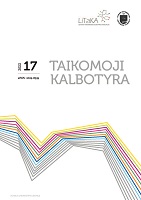Lietuvos kalbos redaktoriai kalbos standartizavimo ir kultūrinės produkcijos laukuose: konkuruojančių nuostatų derinimas
Lithuanian copy-editors in the fields of language standardization and cultural production: negotiating competing notions
Author(s): Eglė JankauskaitėSubject(s): Language studies, Library and Information Science, Sociology of Culture
Published by: Vilniaus Universiteto Leidykla
Keywords: copy-editing; Pierre Bourdieu; field theory; doxa; language standardization;
Summary/Abstract: Using Pierre Bourdieu’s field theory (1991; 1995; 2013) in this article data from semi-structured interviews with Lithuanian copy-editors is analysed to determine, how they negotiate competing notions of two fields, namely the cultural production field and the linguistic field. The analysis has shown that in terms of ethical notions, copy-editors maintain that editing “too much” is unacceptable. This is likely based on the rules of the game of the literary and scientific fields, namely, that a published work ought to reflect the author’s ability, that is, cultural capital, to produce it. Some of the informants claimed to sometimes take on work requiring “too much” editing, but in general, at least in the interview situation they were critical of such practice, linked it to the times of the soviet occupation or claimed that such practice is not copy-editing, but a different service. The informants who also had other occupations important in the literary field and thus enjoyed a higher position in the field than most copy-editors, were the strictest critics of editing “too much”, likely because such practice could undermine the rules of the field. In addition, the analysis of copy-editors’ editing practice-related notions has shown that copy-editors’ editing criteria were clarity and correctness. The analysis has also shown that copy-editors internalized an orthodox notion of the Lithuanian linguistic field, according to which language in publications must correspond to the codified norm, except those cases when “incorrect” variants were used by the author on purpose. Therefore, while copy-editors hold that they should not intervene in the text “too much”, they do not consider language corrections to fall under such interventions, unless the author purposefully “broke the rules”. This orthodoxy assists copy-editors in negotiating their agency in two different fields.
Journal: Taikomoji kalbotyra
- Issue Year: 2022
- Issue No: 17
- Page Range: 119-136
- Page Count: 18
- Language: Lithuanian

